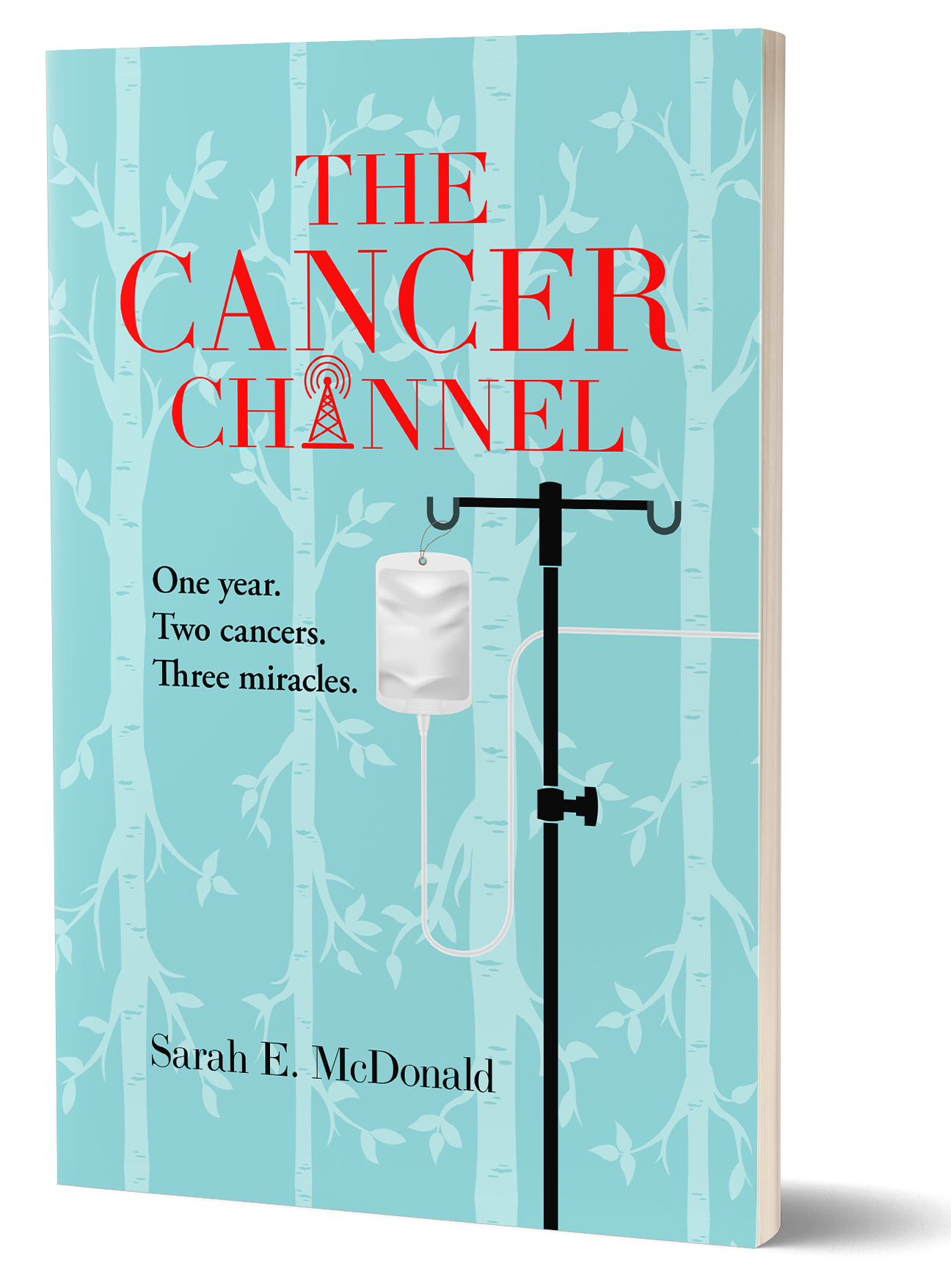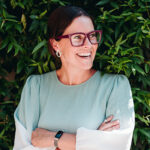One Year. Two Cancers. Three Miracles.
At 44, Sarah McDonald was newly married, newly promoted, and planning pregnancy. It felt like a time of new beginnings in her life when suddenly she was diagnosed with a rare, incurable cancer. Two months later she was diagnosed with another, unrelated cancer. During this struggle, her father’s cancer, ten years in remission, returned and added new challenges but also a cancer buddy to her world.
Told in an honest and oftentimes vulnerable voice, Sarah recounts a year of difficult stories in lighthearted and humorous ways. Readers of this book will laugh and cry – and find it very difficult to set down.

A Story of Hope
If you’re a cancer patient or know and love someone who is on this difficult journey, this book was written for you. In a voice that will make you feel you’ve met a new, fun friend, Sarah shares in vivid detail the events surrounding her year of cancer treatments. She touches on both the terror and the humor that can be found in the little moments that are part of fighting this awful disease. As a survivor and a champion determined to foster better understanding of the dos and don’ts with cancer patients, Sarah provides a story of hope to all who read this very personal memoir.
Want to read an excerpt from the book? Well, look no further – please read below!
Excerpt 1: Prologue
The Cancer Channel: Prologue
“Mommy. I keep all of my magic in my heart. Is that where you keep yours?”
I am sitting with my girl across my lap on the dense, cozy rug in front of our couch. It is mid-afternoon and I have picked her up early from her after school program so that she can have the just-Mommy-and-Rory time she had asked for this morning on our drive to school. She is now big enough that really only her head and her torso can rest on what she calls my “special place” – my lap. “Mommy. Let me sit in your special place,” she demands when we watch movies, when we are at dinner at friends’ houses, when she needs a little reassurance or to feel like my baby again. Sometimes, when I need her to feel like my baby again, I’ll pull her over to my lap – her long, gangly, six-year-old legs splayed out beside us. Those legs won’t fit as I lean over to grab and hold all the parts of her I can still gather in my arms as I cover her face with kisses.
Twenty minutes earlier, this same yummy girl had been standing in front of me with crossed arms and a scowl on her face. She was demanding a ramekin of CheezIts® before she was forced to eat the healthy strawberries I had just cut up for her and she had stamped her foot to punctuate each word.
“We always eat a healthy snack first, Rory,” I reminded my stomping girl. “And I would love to hear you ask me kindly for the CheezIts® rather than yelling at me,” I said, trying to maintain an even voice.
“I! AM! ASKING! KINDLY!” she screeched before sticking her fingers in her ears to block out anything else I might say.
I have been reading all of the child-rearing blogs and books recommended to me while Geoff and I both try to lovingly ride out the roller coaster of BIG feelings that is six. Dr. Laura instructs me that the child acts out because she feels disconnected from me. What I need to do is “establish connection” with her and the grumpy little troll standing in front of me will transform into the love bug I know she can be.
I ask if I can give her a hug. I receive a resounding “No!” and a half-hearted push. After several more attempts and more screeching, my girl finally gives in and lets me hold her. We slowly slump onto the floor and into a tangle of arms and legs.
I rock back and forth with my girl on the rug. She is now cooing at me and making baby sounds. The sun is streaming into our living room and we are bathed in its light. It is one of those enchanted moments in parenting when the world slows for you and your child and you are simply, utterly in love with this small human and her wondrous being.
“Mommy. I keep all of my magic in my heart. Is that where you keep yours?”
I cannot believe this beautiful thing she has just uttered. Truly, she is magical. I am so very lucky, I tell myself for the umpteenth time.
It might not have been like this. In one alternate reality, I was unable to conceive a child. In another alternate reality, I had never married. And in those infinite other realities, there had been the very real possibility that I wasn’t going to – and didn’t – survive my battle with cancer.
In 2012, I was a newly married, forty-something, tech executive undergoing fertility treatments when I was diagnosed with two unrelated, or primary source, types of cancer. “Primary source” means each originated at its own site in my body and was not a spread (metastasis) of the other. Each cancer was intent on, and capable of, killing me on its very own. My prognosis was unclear and I was told that carrying a child was off the table. I felt as if everything in my life had suddenly been taken away from me.
Over the course of one year, I underwent chemo, radiation, and multiple surgeries. I lost my hair and my sense of taste. But against what felt often like impossible odds of cancer statistics – I survived. And later, I carried a baby. My life that had been lost amidst those alternate realities was once again found. Who could have imagined it would be like this?
The concept for this book started with the blog I wrote during that year. I loved writing the blog. It allowed me to explore the sometimes ridiculous stories of physical indignities and personal struggle that a year of fighting cancer brings. And while I certainly experienced terror and pain that year, I also found a whole bunch of stuff to laugh about. In the end, finding the humor in my physical indignities actually helped me get through the larger experience.
I’ve read a number of cancer memoirs, beautifully written with clarity driven by the knowledge that life is precious and short; perhaps the most touching ones published posthumously. I loved diving into their stories and reading the visceral descriptions of the terror they felt (that I felt) when they learned they had cancer. Our shared experience made me feel less alone. But what was missing from these stories is the humor I found from the physical indignities of cancer treatment – the absolute ridiculousness you are (read: I was) willing to endure to claw your life back. I decided I needed to add my stories of hope, humility, and yes, humor to the mix. If my stories can help others who are finding their way on their cancer journey maybe laugh, then the ten (what?!?) years spent writing these stories down will have been worth it.
Since my diagnoses my husband Geoff and I have taken a very open approach to discussing my cancer – not hesitating to share my stories in detail if people are newly diagnosed or simply curious. It is our opinion that cancer (and even death) becomes less scary when we can talk openly about it. That said, Geoff and I haven’t known exactly when it was “appropriate” to share with a child that her Mommy had cancer. She knows her grandfather died from cancer. One warm Saturday afternoon we had friends over for cocktails and these dear friends asked about my cancer status (as loving friends regularly do) within earshot of Rory. Rory perked up and rushed over to me.
“Mommy. You had cancer?” Her little eyes searched mine as I thought about how I would answer this question. I wrapped my arms around my little human.
“Yes, sweetie. I did. But the doctors used medicine to make me better and I don’t have cancer any longer. You don’t need to worry.”
“Ok, Mommy – but I’m keeping my eye on you so you don’t die! And I mean BOTH eyes, Mommy!”
Excerpt 2: One-on-One Yoga Practice
The Cancer Channel: One-on-One Yoga Practice
My friend Tripti has a special room in her home for her yoga practice. It is a serene room where once you close the door, all sounds from her home disappear. You cannot hear her Bernese Mountain Dog, Otis, bounding up and down the stairs or playing with his stuffed toys. You cannot hear her husband, Todd, tapping away at the computer or running a conference call or trying to find the words to tell my husband who has come with me how sorry he is that I have cancer and ask how he can help.
The first thing you notice when you walk into Tripti’s practice room is the small shrine she keeps with a statue of the Hindu deity Ganesh. Tripti will tell me that “Ganesh is known to place obstacles in front of us so that we may overcome them, and learn and grow as people.” But I don’t know this yet. There is also a bookcase filled with books on yoga and meditation. And there are mats and pillows and foam blocks stacked against the wall to support anyone in this serene room who wishes to practice their yoga.
Given that my prior yoga practice was limited, Tripti began this first session gently. We focus first on breathing. We breathe in and we breathe out. We breathe over five counts. We breathe for a long time. I try to match my breathing to hers. And I try to focus on her voice only. Not the voice in my head that is chanting the “I have cancer, I have cancer, I have cancer” mantra, but instead this soothing voice of my friend who is willing me to breathe.
She shows me how to do “child’s pose.” Down on all fours—now put your feet together and allow your knees to push out and create a triangle with your legs. Now lower your butt to your feet and bring your hands together and extend your arms forward. Allow your forehead to touch the ground. Sink into the pose. Breathe. Breathe. Good. Hold the pose. Breathe through the pose. Breathe. Good.
What Tripti doesn’t know is that I had been doing this pose all week without knowing it was child’s pose. It is the pose my body has intuitively taken—a kind of modified fetal position—as the waves of sobs passed through me and I mentally tried to get my head around the fact that I have incurable cancer. Incurable. Cancer.
From child’s pose, Tripti has me transition into a seated position with my legs in front of me, now forming a gentle square as the bottoms of my feet touch and my knees become the sharp opposing points of the square. At first I am just able to keep that position with my hands draped lightly on my sharp knees. I breathe, we breathe. Seconds and minutes go by. Tripti tells me to be concerned only with what is right here in front of me. What is right now. I try to focus on getting this one thing right.
We deepen this pose by bending over our bodies, our legs, our gentle squares with sharp knees. I am a pretzel of limbs. I am a clam that is closed tight. I am a child hiding a secret. I am a woman terrified that she has cancer who is just trying to breathe through the appointments, breathe through the tests, breathe through the treatments, breathe through this pose.
I note that my heart has slowed and I have lost track of time. I have lost so much this week: my health, my perceived immortality, my innocence, my dignity. When my world came to a screeching halt with my diagnosis, somehow, inconceivably, it continued for everyone else. Everyone else is going about their lives and naively believing they have time enough to waste while I wonder if I will still be breathing in and out a year from now.
We end this first yoga practice together sitting with our legs crossed and our hands pressed together in prayer close to our hearts. Tripti says some beautiful words about time taken in practice being a gift to one’s self and about being a light in the world, and then ends with “namaste.” In Hindi, this word means “I bow to the divine in you.” I’ve always suspected many people who say “namaste” do so without truly understanding what it means. Tripti means the phrase sincerely and we bow to the divine in one another. Once we have finished our practice she looks directly in my eyes and asks how I am doing. At the surface she is asking how the yoga practice was for me, but I know what she is really asking is what is going on in my head and in my heart.
Even when you have spent countless evenings/weekends/years sharing your lives across decades, somehow there are subjects that are still taboo between close friends. Dying and Death are two of them.
“This is a safe space, Sarah. You can say whatever you need to say.”
“I know,” I said. I could feel all the things I needed to say lining up in my throat—pushing and shoving one another to be the first one out of my mouth. I wanted to shove them back down. I wanted to gulp them into my stomach where it was too far for them to climb back up and out and be seen for the ugly, small thoughts they were. I wanted to tamp them down so they couldn’t trigger the tidal wave of emotions threatening to breach my levee of control. I feared once they were said, my thoughts, my fears, my new reality couldn’t be unsaid. It/they/this would be true.
Of course we all die. Of course, we all die. I just didn’t want it to be true for me. Not now. Maybe not ever.
I lose my battle with my ugly, small thoughts and they come pouring out of me in no coherent order. I lay them in front of her like I am laying out photos of myself naked. I am ashamed and yet once I start, I cannot stop. I am saying aloud all of the thoughts that have left me prone in my bedroom for the last week. I find myself climbing into that prone position as I whisper my darkest fears to her.
“I don’t know how to do this. I don’t know how to say or do any of this. I don’t know how to die at 44. I don’t know if this is the last year of my life and if it is, what does this year look like? I know I have a high threshold for pain, but I don’t know how much dying is going to hurt. Can I handle it? Beyond the physical pain, I’m not sure I can handle the emotional pain. Right now I’m so stressed out that I’m not convinced I won’t die of a heart attack before the cancer can have a chance to kill me. I’m honestly losing my mind. I can’t eat. I can’t sleep. And all I keep thinking is: I have cancer. If I have to die now—this year—is there a way that I can die gracefully, not embarrass myself? If I have to die, I desperately want to die well, without hysteria and loss of dignity. And I just don’t know if I can do that because I’m just so scared. I’m so scared.”
My voice was shaking. My whole body was shaking. I don’t know that I have ever been more vulnerable with another human being.
I don’t think Tripti tried to tell me that everything was going to be okay, or that it would be different from what I was describing. She listened and she cried with me. And she promised to be with me regardless of the outcome. She promised that we would take everything one step at a time. She would be the captain of Team Two. She would help me breathe.
Get the Book from Your Favorite Bookseller
What Others Are Saying About The Cancer Channel

Sarah McDonald is one of the most inspiring people I know. This book captures what I got to see in person when I was CEO of eBay, how her authenticity, positive mindset and true courage helped transform everyone around her.

The Cancer Channel offers us a front passenger seat in the journey to fight cancer. Whether you are battling it yourself, know someone who is, or want to read an incredible story of raw and real resilience—this book is for you.

Equal parts heartbreaking and hopeful, this is a wonderful story of perseverance amidst an improbable battle with not one, but two cancers. Sarah brings this to life in a witty and engaging way that gives you real insight into what it is really like to go toe-to-toe with this terrible disease — and come out on the other side.

This is the book you hope you or a loved one will never need to read. The Cancer Channel is Sarah’s personal and unvarnished experience with the belief that cancer becomes less scary when we can talk openly about it. With humility and humor, she brilliantly shares her personal struggle to help bring hope and courage to anyone in their fight against cancer.

Only Sarah McDonald can write a book that makes you feel like you have a new friend and an old friend by your side all at the same time. She guides you personally through how to handle a crisis with humor, humility and grace. She also teaches us as leaders how to handle these very hard, delicate situations with humor, humility and grace.

I highly recommend this book for patients, caregivers, and their family & friends. Sarah provides an intimate and honest view of her cancer journey, while at the same time providing hope that better days lay ahead for anyone facing a health challenge.

This honest, and at times raw memoir brings the reader along on the journey to face their fears with grace, passion and humor. Each enlightening and inspiring lesson is an excellent reminder of specifically how to support a friend in need.

Sarah’s memoir not only captures her powerful journey, lessons learned, and tremendous fortitude, but it is a strong call to action for employers everywhere to take a hard look at how they can better support their employees struggling with life-threatening diseases. She is living proof that providing the time and space to fully heal leads to better outcomes for the employee and greater loyalty to the company.

This book is critical for those of us who have friends battling cancer – but also for those of us who have teammates with cancer. Sarah gives us insight into how we can best show up for both.

Sarah’s book is a call to arms to physicians, patients, and to friends, family, and employers to be more reachable, to take ownership of their medical records and decision-making, and to be even more in-the-moment and listening. It’s a brave, honest, often humorous voice to the physical and emotional pain of incurable cancer, and the hope that, if we can silence its voice from time to time, we can focus on the positives and, with the help of a strong collective effort, survive if not thrive in its wake.
Not only does Sarah delve into the unknowns of a rare cancer diagnosis but her journey resonates with every person impacted by cancer. It’s a story about the fragility of life, human resilience, and the power of turning gratitude into action. We are grateful to Sarah reminding us that ‘extraordinary moments do happen on ordinary days.’

I laughed. I cried. I couldn’t sleep because I couldn’t put the book down. Sarah’s humanity and humor kept me talking about her story long after I put the book down.

Sarah has a special way of pulling you in to her personal triumph over cancer(s) through very honest, emotional and engaging storytelling.

Battling two cancers while trying to get pregnant for the first time, Sarah takes us through her journey with a positive perspective. Her heart, humor and humanity shine through in this book which is a must read for anyone navigating cancer care.

This book is a window into the mind of a 40 year old woman fighting two cancers simultaneously, while handling the pressures of a career and marriage. Not only does it include the elements of fear, bravery and triumph you’d expect from a book like this, but it’s also filled with humor and a metrics based process that are unexpected and will make you laugh out loud.

Many people and families, including ours, have faced the intense fear and sadness of cancer. And, as Sarah so eloquently and authentically shares, there can also be humor and hope in the midst of the pain and challenge.

Visceral, hilarious, devastating, and hopeful, Sarah McDonald has opened a intimate window to the lived experience of cancer and survivorship. I’d recommend this read to anyone in health care to remember for why we do the work. I am a better clinician for it.

The Cancer Channel is a powerful, moving, and raw read. Sarah’s writing is emotive, beautifully descriptive, and flat out funny. Through her story telling of the most intimate and vulnerable moments of her “cancers” journey, she inspires and demonstrates incredible resilience and courage. Sarah’s “voice” is acutely authentic and I felt all her highs and her lows. THANK YOU Sarah for broadcasting The Cancer Channel to the world.

Sarah’s survival story through more than one cancer and infertility is an incredible journey that will leave the reader inspired and hopeful. Consider gifting this book to loved ones seeking encouragement, direct talk, and humor.